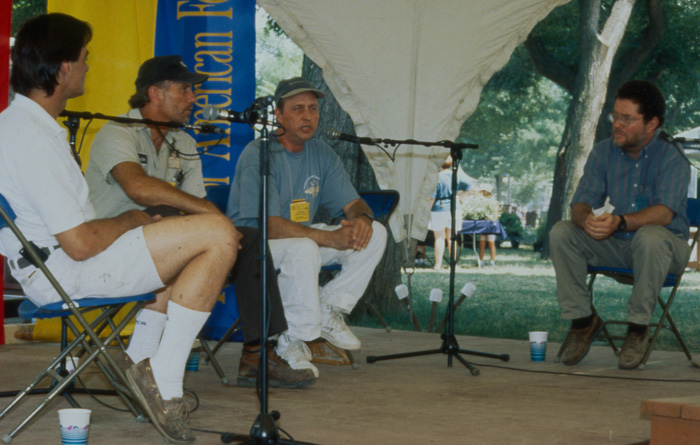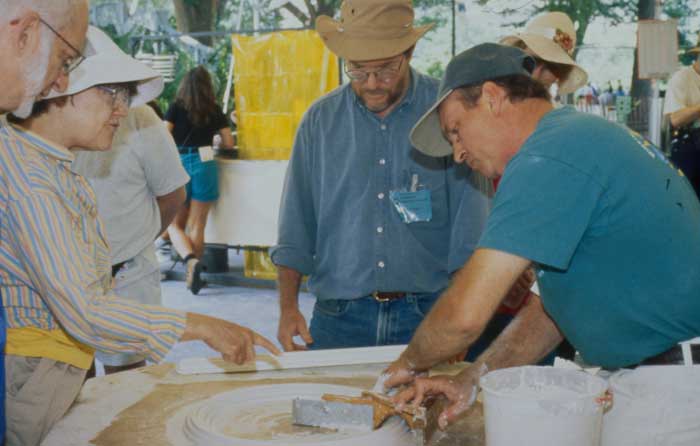2013 Annual Ralph Rinzler Memorial Concert: In Recognition of the Legacy of Peter Seitel

The 2013 Ralph Rinzler Memorial Concert pays tribute to Dr. Peter Seitel, whose long and distinguished tenure at the Smithsonian Center for Folklife and Cultural Heritage included service as senior folklorist, director, and Web master. This annual concert honors the life and contributions of the late Ralph Rinzler, whose humanity, organizational vision and skills, and artistic and intellectual contributions built the legacy on which the Center stands today. Peter Seitel was both Rinzler’s long-time friend and one of his primary colleagues, epitomizing the type of collaborator that Rinzler sought to further the Center’s work with cultural scholars, policy makers, and grassroots communities.
Seitel holds a doctorate in folklore from the University of Pennsylvania. His dissertation was based on fieldwork in northwestern Tanzania focusing on the conversational use of proverbs and logical structures in metaphor. This long-term research interest led to his publication of The Powers of Genre: Interpreting Haya Oral Literature (Oxford University Press, 1999), and to the invention of Synchrotext, a ground-breaking computer software that enables the creation and playback of richly annotated media files.
Prior to working at the Center, Seitel was assistant professor and head undergraduate advisor in the department of anthropology at Princeton University. Seitel began working with the Smithsonian Office of Folklife Programs in 1974, curating a Smithsonian Folklife Festival program featuring transportation workers. He was appointed as senior folklorist in 1978 and remained with the Center until 2006, serving as director from 1983 to 1988. His pioneering applications of computer technology helped develop the Center’s early Web presence.

Over the last decade, Seitel contributed significantly to the practices and discussions of cultural heritage policy on an international level. He organized a major conference on intangible cultural heritage that included Smithsonian scholars, UNESCO members, community tradition bearers, and other stakeholders. He is the editor of Safeguarding Traditional Cultures: A Global Assessment (CFCH, 2001). And he played a key role in defining the UNESCO Convention on Intangible Cultural Heritage, which was adopted in 2003.
Peter Seitel is an exemplar of the Center’s commitment to join quality scholarship with strong community partnership. The collegial work of Rinzler and Seitel was centered on Rinzler’s penchant to have smart, inquiring, scholarly capable and forthright associates committed to delving into serious concepts and methods for the development of Center projects that engaged communities in their complexities, not simple representation. The Smithsonian Center for Cultural Heritage is proud to honor Peter Seitel for his work with Ralph Rinzler and for his development of significant contributions to the fields of folklore, performance studies, anthropology, linguistics, and oral history.
James Counts Early is director of cultural heritage policy at the Smithsonian Center for Folklife and Cultural Heritage. He began his work with the Smithsonian in 1972, and his applied research explores participatory museology, cultural democracy, statecraft policy, capitalist and socialist discourses in cultural policy, and Afro-Latin politics, history, and cultural democracy.
The Ralph Rinzler Memorial Concert is scheduled for Friday, June 28, 6 p.m. to 7:15 p.m., Danubia Stage (in the Hungarian Heritage program area)
This special event features a performance by The Seldom Scene, an influential D.C.-area bluegrass band that has played a significant role in popularizing the genre and expanding its repertoire. Because all of the founding band members had day jobs (as do all current members) and one of the original members had an aversion to air travel, the group only performed locally a couple of evenings each week and at nearby festivals on weekends. They would therefore be seldom seen, seldom on the scene, or, as a play on words, “Seldom Scene.” Two members of the band have worked at the Smithsonian Center for Folklife and Cultural Heritage, overlapping with the tenure of this year’s honoree, Peter Seitel. Longtime…Seldom Scene, the group’s first album with Smithsonian Folkways Recordings, will be available in 2014.

